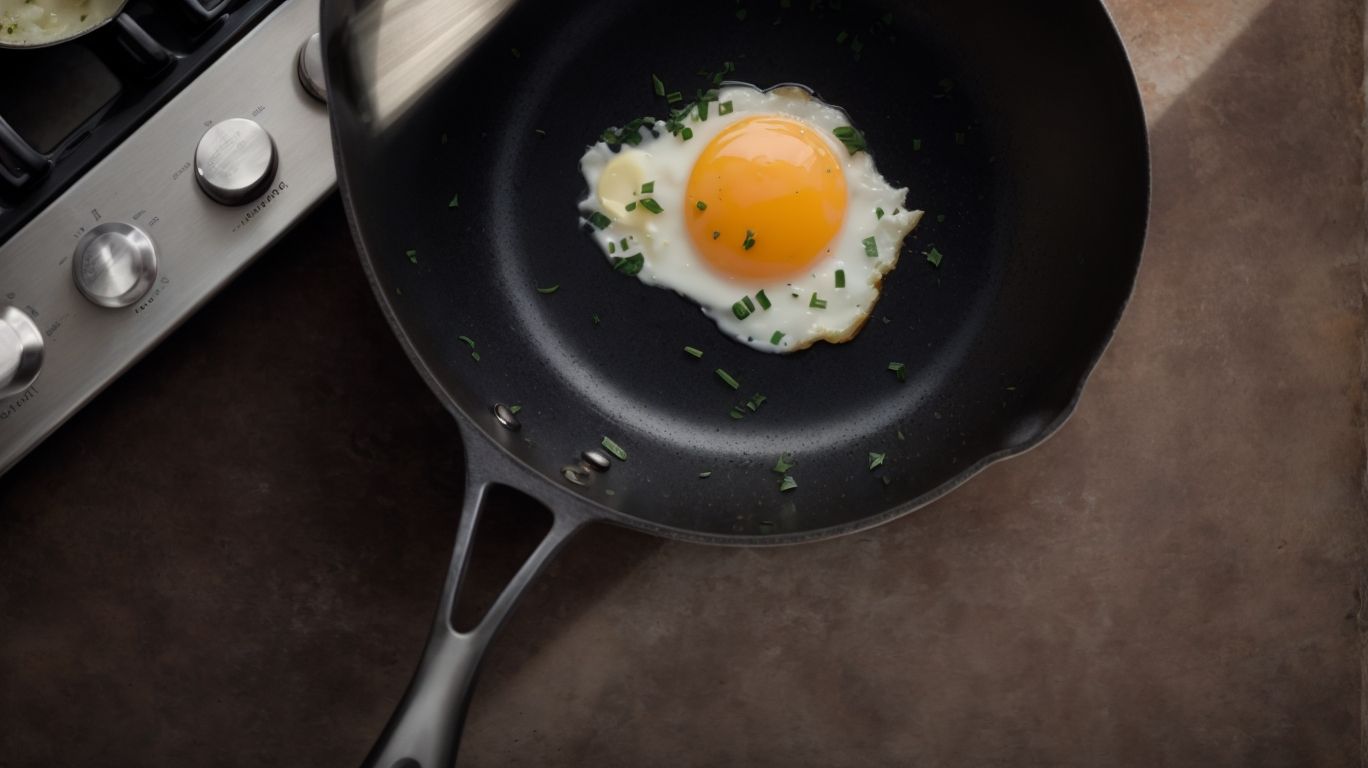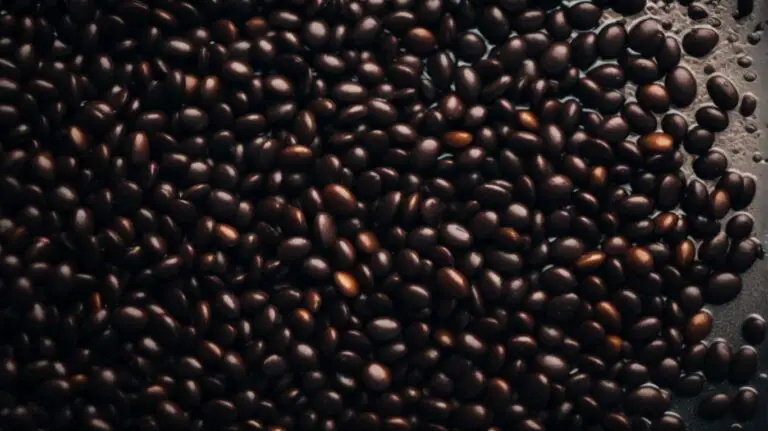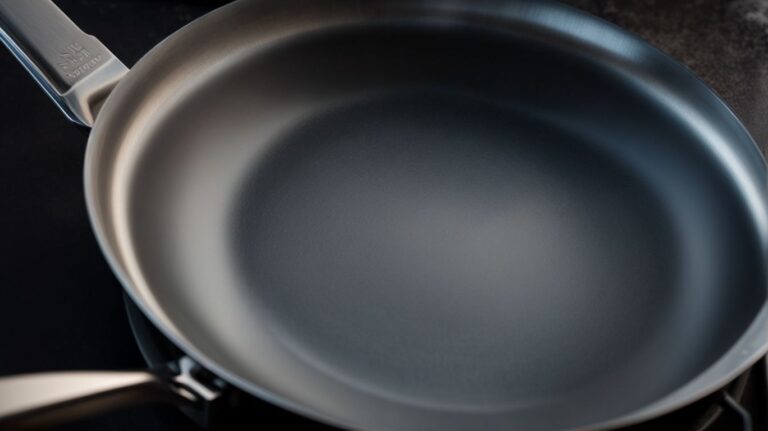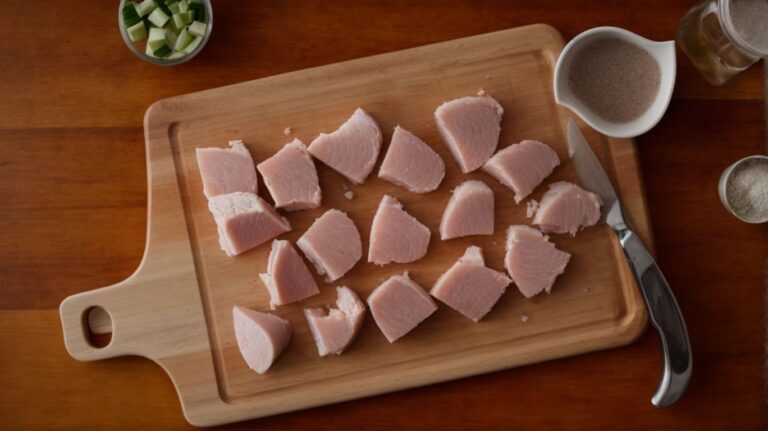How to Cook Eggs on Stove?
If you’re looking to elevate your breakfast game, cooking eggs on the stove is a skill worth mastering.
We’ll explore why cooking eggs on the stove is the way to go, from its versatility to the control over cooking temperature and faster cooking time.
Find a step-by-step guide, essential ingredients, and tips for perfectly cooked eggs. Get all the information you need to become an egg-cooking pro!
Key Takeaways:
Why Cook Eggs on Stove?
Cooking eggs on the stove offers a myriad of benefits that enhance the culinary experience, providing versatility, precise temperature control, and faster cooking times compared to other methods.
When you cook eggs on the stove, you have the flexibility to choose from a wide range of cooking methods, whether you prefer scrambled, fried, poached, or boiled eggs. The pan’s direct contact with the heat source allows for quick and efficient cooking, giving you better control over the texture and doneness of the eggs.
With stovetop cooking, you can easily adjust the heat to achieve the perfect results, ensuring that your eggs are cooked to your liking every time. This level of temperature control is crucial, especially when cooking delicate egg dishes like omelettes or custards.
Versatility
The versatility of cooking eggs on the stove allows for a wide range of culinary possibilities, from simple fried or scrambled eggs to complex gourmet recipes that showcase the ingredient’s adaptability.
In terms of cooking eggs, each method offers a unique texture and flavor profile.
- Boiling eggs on the stove is perfect for breakfast, salads, or as a snack.
- For those who prefer a runny yolk, poaching eggs in simmering water creates a delicate dish ideal for topping toast or salads.
- Hard-boiling eggs for salads or snacks is a staple in many kitchens, providing a convenient and protein-rich option.
Control Over Cooking Temperature
When cooking eggs on the stove, you have precise control over the cooking temperature, ensuring that the eggs are cooked to perfection without overheating or undercooking.
The pan you choose plays a crucial role in the egg-cooking process. A good quality non-stick pan with a flat bottom helps distribute heat evenly, preventing hot spots that can lead to uneven cooking.
Heat
is another key element; using medium-low heat allows the eggs to cook slowly and evenly, resulting in a creamy texture. Adding a small amount of butter not only enhances the flavor but also helps prevent sticking and adds richness to the eggs. By managing these factors, you can create delicious and perfectly cooked eggs every time.
Faster Cooking Time
Cooking eggs on the stove significantly reduces the cooking time, allowing you to enjoy a delicious meal in minutes by efficiently preparing the whites and yolks to the desired consistency.
One efficient method for perfectly cooked egg whites is to cover the pan while cooking, which helps in trapping steam, ensuring even cooking without flipping. For runny yolks, it’s essential to keep the heat low and cover the pan to gently cook the yolks without overcooking the whites.
By mastering the art of timing and heat control, you can achieve that ideal balance between firm whites and creamy yolks, elevating your breakfast or brunch to a whole new level of deliciousness.
What You’ll Need
To cook eggs on the stove successfully, you’ll need a few essential items such as fresh eggs, a suitable pan, cooking oil or butter, and a reliable spatula for flipping or stirring.
When preparing to make eggs on the stove, the fresh eggs play a crucial role in the overall taste and quality of the dish. Opt for eggs that are not past their expiration date and are preferably organic or free-range for the best flavor. The choice of pan is also important; a non-stick or well-seasoned cast-iron pan works well for even cooking and easy cleanup.
Using the right cooking oil or butter is key to preventing the eggs from sticking to the pan and adding moisture and flavor. Olive oil, butter, or even coconut oil can enhance the taste of your eggs.
A reliable spatula is necessary for gently stirring scrambled eggs or flipping omelets with precision. Look for a spatula with a comfortable grip and a thin, flexible edge to ensure proper maneuverability. With these essential items in hand, you’re all set to cook delicious eggs on the stovetop!
Eggs
The key ingredient for cooking eggs on the stove is, of course, the eggs themselves, which serve as the foundation for various recipes and culinary creations.
Using fresh eggs is crucial when preparing stove-cooked egg dishes because the quality and flavor of the eggs can greatly impact the final outcome. Fresh eggs have a firmer white and a more pronounced yolk color, which enhances the visual appeal of the dish. When cracked open, fresh eggs have a stronger structure, making them less likely to break during cooking. This structural integrity is essential for dishes like sunny-side-up eggs or poached eggs that require a delicate cooking process.
Non-Stick Pan
A non-stick pan is essential for cooking eggs on the stove as it prevents sticking and ensures easy flipping or sliding of the eggs during the cooking process.
When using a non-stick pan, you can greatly reduce the amount of oil or butter needed for cooking, making your meal healthier. The smooth surface of the pan also promotes even cooking and prevents uneven browning of the eggs. Cleaning up after cooking becomes a breeze with a non-stick pan, as food residues are less likely to cling to its surface. This type of pan is not only ideal for eggs but also for various other delicate foods that require gentle cooking methods.
Cooking Oil or Butter
Cooking oil or butter is necessary for greasing the pan and adding flavor to the eggs, enhancing their texture and preventing them from sticking during the cooking process.
When you cook eggs, using cooking oil or butter is essential to ensure that they do not stick to the pan’s surface, making the cooking process smooth and hassle-free. These fats play a crucial role in enhancing the overall flavor of the dish, imparting a rich and indulgent taste to the eggs.
The choice between oil and butter can significantly impact the texture of the eggs. Butter can provide a creamy and rich consistency, while cooking oil can yield a lighter and more delicate texture, allowing you to tailor the eggs according to your preferences.
By incorporating cooking oil or butter into your egg preparation method, you not only elevate the taste and texture but also ensure efficient cooking, making your breakfast experience truly delightful.
Spatula
A reliable spatula is a must-have tool for cooking eggs on the stove, allowing you to flip, stir, or serve the eggs with precision and ease using a skillet or pan.
In terms of the versatility of a spatula, there are several key functions that make it essential in the kitchen. The thin, flat edge of a spatula is perfect for smoothly flipping delicate eggs without damaging them or breaking the yolks. The ergonomic design of a spatula also makes it ideal for gently stirring scrambled eggs in a skillet, ensuring even cooking and distribution of ingredients.
A spatula’s broad surface area is excellent for effortlessly transferring cooked eggs from the skillet to the plate, allowing you to serve up a delicious and visually appealing breakfast or brunch creation. Whether you are a seasoned chef or just starting out in the kitchen, a high-quality spatula is an essential tool for mastering the art of cooking eggs on the stove.
Step-by-Step Guide to Cooking Eggs on Stove
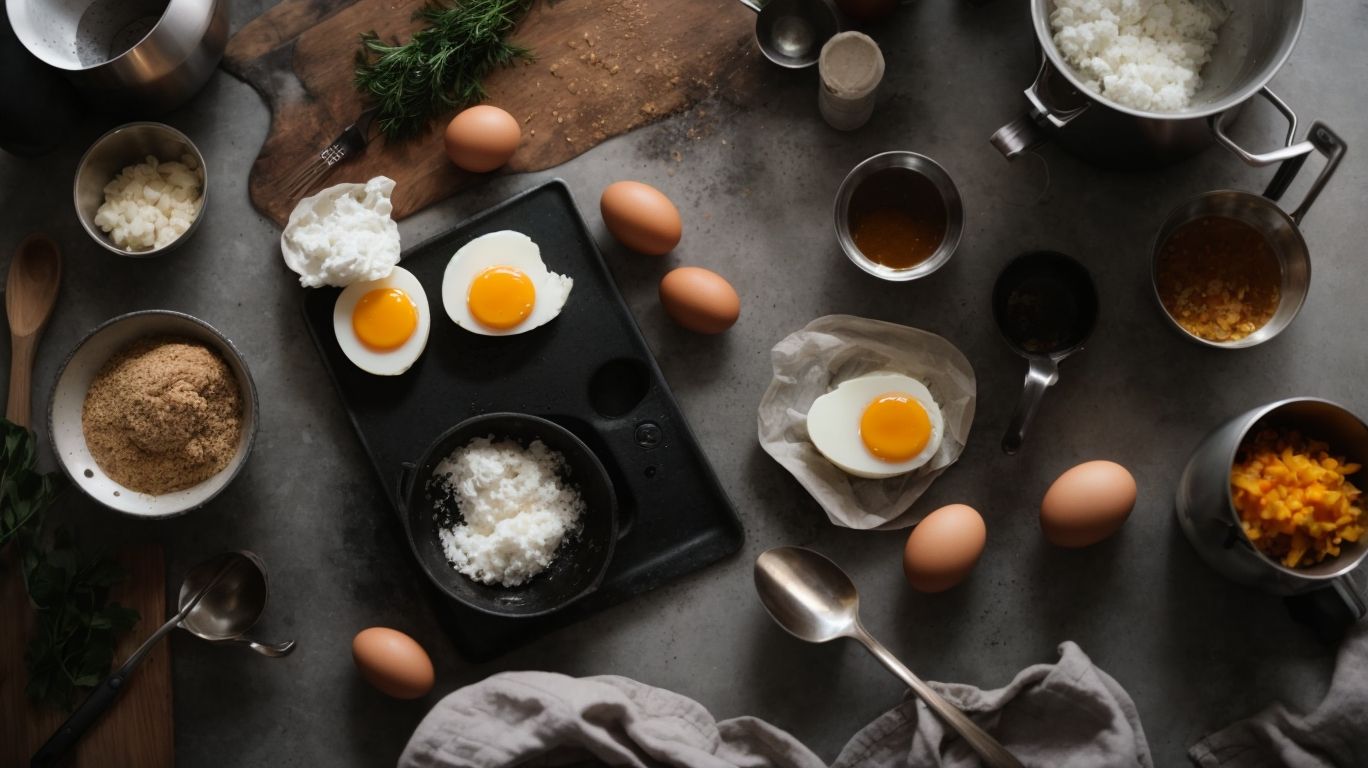
Credits: Poormet.Com – Logan Green
Mastering the art of cooking eggs on the stove involves a step-by-step process that ensures the perfect balance of heat, timing, and technique for achieving delectable results.
To begin, start by selecting a non-stick pan; this choice prevents the eggs from sticking and eases the cleaning process.
Heat the pan on medium heat and add a small amount of oil or butter.
Crack the eggs carefully into the pan, ensuring not to break the yolk.
As the egg whites start to set, lower the heat to allow the yolks to cook without overcooking the whites. Patience is key here; the slower the cooking process, the creamier and more flavorful the eggs will be. Serve hot and enjoy!
Heat the Pan
The first step in cooking eggs on the stove is to heat the pan to the appropriate temperature, ensuring even cooking and preventing the eggs from sticking during the process.
Heating the pan correctly before adding the eggs is crucial as it helps to create the ideal cooking environment. When the pan is properly heated, the eggs will cook more evenly, resulting in a perfectly cooked dish. If the pan is not hot enough, the eggs may stick to the surface, leading to a messy cleanup and potentially ruining the texture of the eggs. By heating the pan adequately, you set the stage for a successful cooking experience.
Add Oil or Butter
Once the pan is heated, add a small amount of oil or butter to create a non-stick surface and enhance the flavor of the eggs as they cook.
By introducing oil or butter into the hot pan, you are not only preventing the eggs from sticking, but also infusing them with rich flavors. The fats from the oil or butter contribute to a delicious taste and crispy texture, elevating the overall quality of the dish.
Oil is often favored for its neutral taste and higher smoking point, while butter adds a creamy richness to the eggs. The method of incorporating these fats at this stage ensures that the eggs cook evenly and develop a beautiful golden hue.
Crack the Eggs
Carefully crack the eggs into the pan, ensuring that the whites and yolks remain intact for a visually appealing and flavorful cooking result.
Start by gently tapping the egg against a flat surface to create a crack without damaging the yolk. Use your thumbs to open the shell over the pan, allowing the yolk and whites to slide out smoothly. Pay attention to any shell fragments that may fall to avoid contamination. Keeping the yolk whole can enhance both the appearance and taste of your dishes, as the intact yolk can create a beautiful contrast against the solidifying whites for an appealing visual presentation.
Cook to Desired Doneness
Cook the eggs to your desired level of doneness, whether it’s runny, medium, or well-done, adjusting the heat and cooking time accordingly for perfect results.
For runny eggs, poaching is an ideal method where the whites are just set, and the yolks are delightfully liquid. Bring water to a gentle simmer, add a splash of vinegar, and swirl the water before gently sliding in the eggs. Cooking for about 2-3 minutes ensures the desired consistency.
If you prefer medium eggs, opt for boiling them. Place the eggs in boiling water and immediately reduce the heat to low. Cook for about 7 minutes for a gooey yolk with a slightly firmer white.
When aiming for well-done eggs, a simple method is to scramble them on low heat, constantly stirring until no liquid is visible. This results in firm whites and a fully set yolk.
Remove from Heat and Serve
Once the eggs are cooked to perfection, remove them from the heat and serve immediately to enjoy their tender, delicious flavors at their best.
In terms of removing the eggs from the heat, a key point is to time this step carefully. Overcooked eggs can become rubbery, losing their delicate texture. To ensure the eggs are still soft and creamy, use a spatula to gently slide them onto a plate. Handling them with care will preserve their consistency.
After removing the eggs from the heat, it is crucial to serve them promptly. Eggs tend to continue cooking even after being removed from the stove, so serving them right away ensures that you enjoy them at their peak. Garnishing with a sprinkle of fresh herbs or a pinch of salt can enhance the flavors. The perfect moment to savor your perfectly cooked eggs is now!
Tips and Tricks for Perfectly Cooked Eggs
Achieving perfectly cooked eggs on the stove requires attention to detail and some expert tips and tricks that can elevate your breakfast or meal to a whole new level of culinary delight.
One crucial step in cooking eggs is to ensure that you use a non-stick pan to prevent sticking and ensure easy cleanup afterward. Adjusting the heat is key; start with medium heat to prevent the eggs from cooking too quickly. To enhance the flavor, add a pinch of salt and pepper before or during cooking.
Experiment with different cooking techniques such as scrambling, frying, or poaching to discover your favorite way to enjoy eggs. Remember, practice makes perfect, so keep trying until you achieve the desired consistency and taste.
Use a Non-Stick Pan
Opt for a non-stick pan when cooking eggs on the stove to prevent sticking and ensure easy cleanup, enhancing your cooking experience and maintaining the integrity of the eggs.
Cooking eggs in a non-stick pan provides the benefit of requiring less oil or butter, promoting healthier cooking. The non-stick surface allows for easy flipping and sliding of the eggs, resulting in perfectly cooked eggs each time. The even heat distribution of the pan ensures that your eggs are cooked consistently without any burnt spots or uneven cooking. This method not only saves you time but also reduces the risk of overcooking, leading to delicious and fluffy eggs every time you cook.
Use Medium-Low Heat
To avoid overcooking or undercooking eggs on the stove, it’s crucial to use medium-low heat that allows for gentle and even cooking, ensuring the perfect texture every time.
Medium-low heat is ideal for eggs as it prevents the proteins from firming up too quickly, resulting in a rubbery texture. When you cook eggs over low heat, you have more control over the process, leading to a creamy and velvety consistency.
This method also helps in preserving the delicate flavors of the eggs, allowing them to shine without being overpowered by excessive heat. By taking your time and gently cooking eggs on medium-low heat, you can achieve a perfect dish that is both visually appealing and delicious.
Add a Lid for Steam Cooking
When looking to achieve fluffy and tender eggs on the stove, consider adding a lid to the pan for steam cooking, which enhances the cooking process and retains moisture for delightful results.
By trapping steam inside the pan, the lid helps maintain a consistent level of heat, ensuring that the eggs cook evenly without overcooking or drying out. This gentle method of simmering the eggs in their own moisture
- preserves their natural flavor
- locks in the nutrients
- eliminates the risk of a rubbery texture.
The result is perfectly cooked, soft eggs that practically melt in your mouth, making your breakfast experience truly enjoyable.
Season Eggs Before Cooking
Enhance the flavor profile of your eggs by seasoning them with a pinch of salt and a sprinkle of pepper before cooking, adding depth and richness to the final dish.
Seasoning your eggs before cooking not only enhances the overall taste but also brings out the natural flavors of the eggs themselves. The salt helps to accentuate the richness of the eggs, while the pepper adds a delightful kick of spice that elevates the entire dish.
By taking the time to season your eggs properly, you ensure that each bite is bursting with flavor and satisfaction. The method of seasoning before cooking allows the flavors to meld together during the cooking process, resulting in a perfectly balanced and delicious dish.
Conclusion
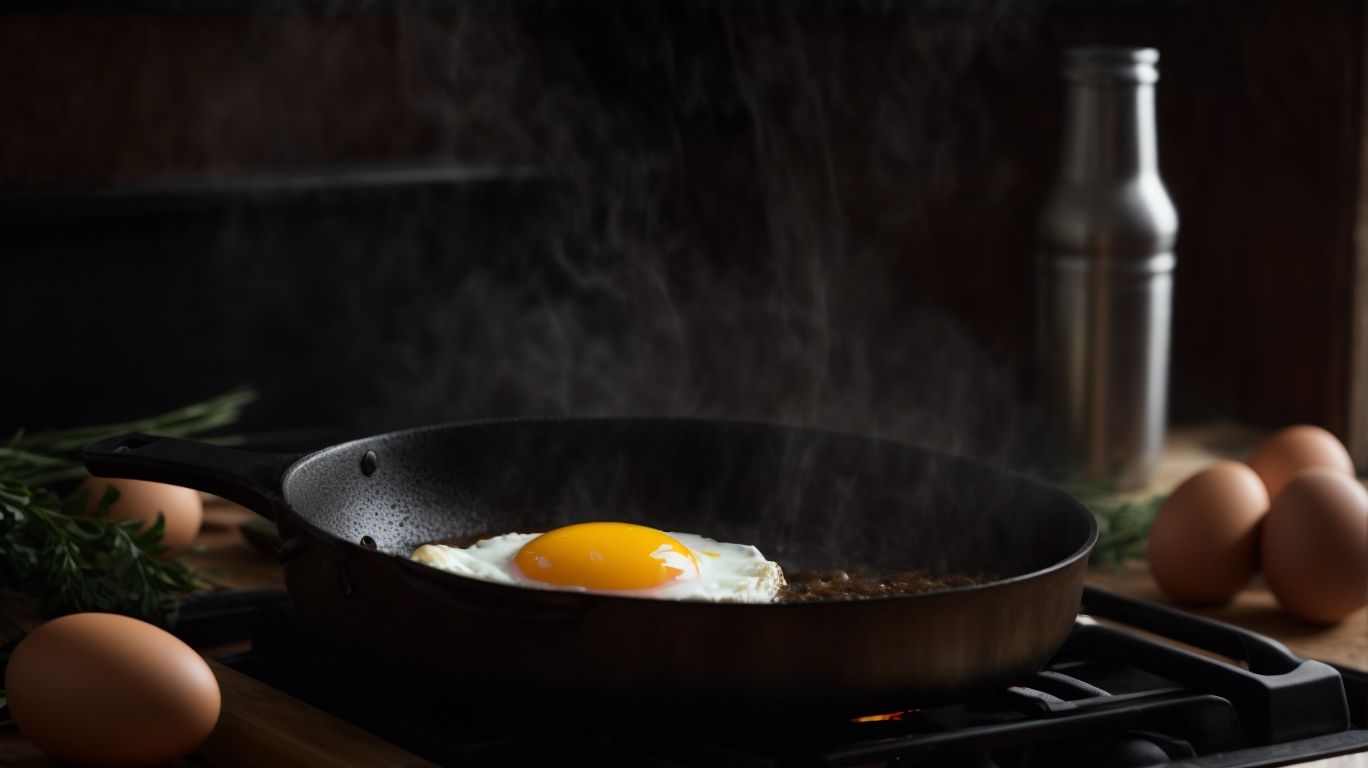
Credits: Poormet.Com – Richard Roberts
Cooking eggs on the stove offers a versatile and efficient way to create delicious meals, with precise temperature control and a range of cooking methods that cater to various culinary preferences.
One of the key benefits of cooking eggs on the stove is the adaptability it offers in recipes. Whether you prefer scrambled eggs, fried eggs, poached eggs, or even omelets, the stove provides the perfect platform to experiment with different cooking methods.
Efficiency is another advantage of stove cooking for eggs. With a quick preheat, you can have your eggs cooked to perfection in just a few minutes, making it a time-saving method for busy mornings or whenever hunger strikes.
FAQs about Cooking Eggs on Stove
If you find yourself wondering about the nuances of cooking eggs on the stove, delve into these frequently asked questions to gain insights into perfecting your egg-cooking skills and techniques.
In terms of cooking eggs on the stove, the method you choose can significantly impact the outcome. One popular method is sunny side up, where the egg is cracked into a hot pan and cooked until the whites are set but the yolk remains runny.
Another common method is scrambled eggs, where the whites and yolks are whisked together before being poured into a heated pan. Stirring continuously while cooking ensures a creamy texture.
Utilizing a non-stick pan can make the process smoother by preventing the eggs from sticking, while adjusting the heat levels ensures the eggs cook evenly without burning.
Can I Cook Eggs on a Cast Iron Skillet?
Yes, you can cook eggs on a cast iron skillet, as the even heat distribution and retention of cast iron make it an excellent option for achieving delicious stove-cooked eggs with enhanced flavors.
When using a cast iron skillet for cooking eggs, the first step is to preheat the skillet properly over medium heat. Preheating ensures even cooking and helps prevent sticking. Remember, cast iron heats up slowly but retains heat well, offering a consistent cooking temperature. Eggs can be fried, scrambled, or even poached on a cast iron skillet. The versatility of this method allows you to cook eggs to your preferred level of doneness.
To prevent the eggs from sticking, it’s crucial to use enough fat, such as butter or oil, in the skillet before adding the eggs. This not only prevents sticking but also enhances flavor and promotes a nice golden crust. The natural non-stick properties of a cast iron skillet can develop over time with proper seasoning and care, making it an ideal choice for cooking eggs.
Can I Add Vegetables or Meat to the Eggs?
Absolutely, incorporating vegetables or meat into your egg dishes on the stove can elevate the flavors and nutritional value of your meals, providing a wholesome and satisfying culinary experience.
Whether you’re a fan of classics like spinach, mushrooms, and peppers or want to venture into more exotic options like artichokes or sundried tomatoes, the possibilities are endless when it comes to enhancing your stove-cooked eggs.
- Try sautéing a mix of colorful bell peppers and onions before adding your cracked eggs for a vibrant and flavorful scramble.
- Experiment with adding leftover roasted veggies like sweet potatoes or Brussels sprouts for a unique twist on the traditional omelette.
Can I Cook Multiple Eggs at Once?
Yes, you can cook multiple eggs at once on the stove, provided you use a suitable pan size and adjust the cooking method to ensure even cooking and consistent results across all eggs.
When choosing a pan for cooking multiple eggs, opt for a size that accommodates the eggs without overcrowding the surface, ensuring each gets ample space to cook evenly. A pan with a non-stick surface will help prevent the eggs from sticking and make flipping easier.
Cooking multiple eggs simultaneously can be done using methods such as scrambling them together in the pan, cooking them sunny side up, or making an omelette.
Methods like using a lower heat setting and covering the pan can promote even cooking. It’s essential to keep an eye on the eggs and adjust the heat as needed to prevent overcooking or undercooking. By following these tips, you can achieve uniformly cooked eggs for a delicious meal.
Frequently Asked Questions
How to Cook Eggs on Stove?
1. What is the best method to cook eggs on the stove?
The best method to cook eggs on the stove is by using a non-stick pan and cooking them on low to medium heat. This allows for better control and prevents the eggs from sticking to the pan.
2. How do I prevent my eggs from sticking to the pan?
To prevent eggs from sticking to the pan, make sure to use a non-stick pan and add a small amount of oil or butter before cooking. You can also use cooking spray instead of oil for a healthier option.
3. What is the ideal temperature to cook eggs on the stove?
The ideal temperature to cook eggs on the stove is between low to medium heat. This allows for a slower cooking process and prevents the eggs from burning or overcooking.
4. How long should I cook eggs on the stove?
The cooking time for eggs on the stove will vary depending on the desired doneness. For soft boiled, cook for 3-4 minutes, for medium boiled, cook for 5-6 minutes, and for hard boiled, cook for 8-10 minutes.
5. Can I use a regular frying pan to cook eggs on the stove?
Yes, you can use a regular frying pan to cook eggs on the stove, but make sure to use a non-stick pan or add oil/butter to prevent the eggs from sticking.
6. What is the best way to season eggs while cooking on the stove?
The best way to season eggs while cooking on the stove is to add salt and pepper to taste. You can also add other seasonings like herbs, spices, or grated cheese for added flavor. Make sure to season the eggs towards the end of cooking to prevent them from becoming too salty.

